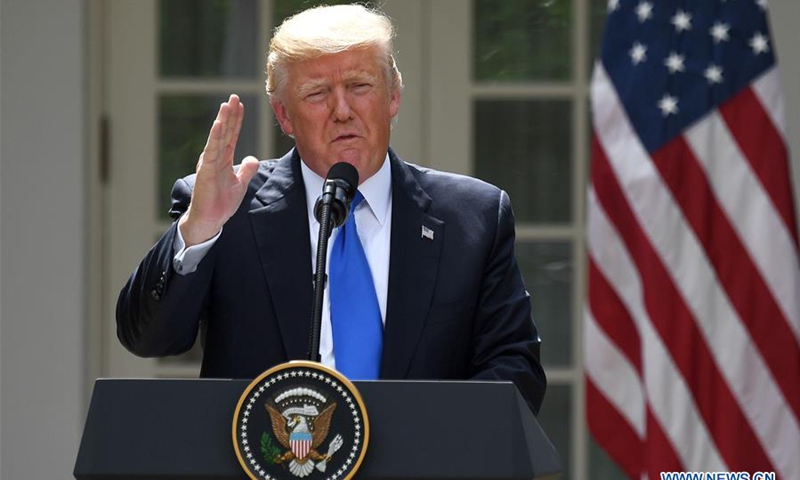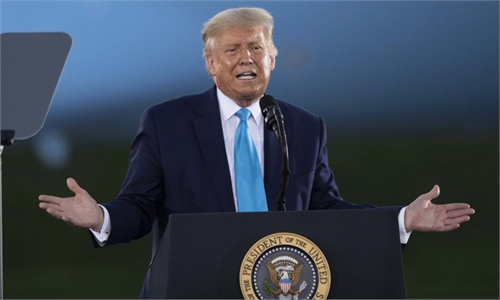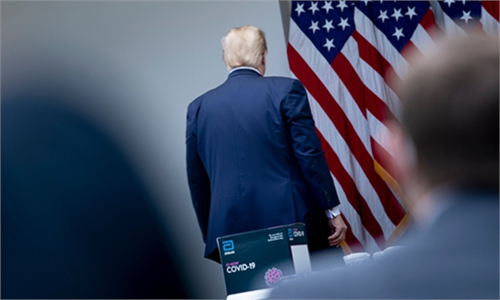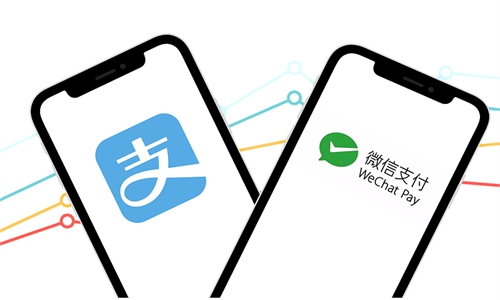
US President Donald Trump (Xinhua file photo/Yin Bogu)
Outgoing US President Donald Trump on Tuesday issued a ban on US transactions with eight Chinese mobile apps, in his latest move to further escalate a long-running tech war against China even as he is expected to leave the White House in just about two weeks.
Many Chinese analysts do not expect the new Trump executive order to be implemented given the limited time Trump has left in office and the potential legal challenges from US users and companies. The move is nothing more than last-minute political grandstanding for Trump to show his "toughness" against China that aims to set up traps to hamstring his successor President-elect Joe Biden, the analysts said.
In the executive order, Trump prohibited any person subject to US jurisdiction from conducting transactions with Alipay, CamScanner, QQ Wallet, SHAREit, Tencent QQ, VMate, WeChat Pay, and WPS Office, citing a national security threat - a frequently used reason for US crackdowns on Chinese firms that Chinese officials have repeatedly called a baseless claim.
The specific transactions and persons involved would be identified by US Secretary of Commerce Wilbur Ross, who is directed to submit a report within 45 days, according to the executive order. In a statement on Tuesday, Ross said that he had directed the department to begin implementing the order, including identifying prohibited transactions.
The eight Chinese apps targeted by the US involve payments, messaging, video sharing and enterprise tools. While some are popular in the US, others have a minimal presence. CamScanner, for example, has 4.4 billion downloads in the US in 2020, while Alipay, which has over 1 billion users globally, only had over 200,000 downloads in the US last year,, according to the Wall Street Journal.
WPS Office said on Wednesday that Trump's new executive order would not have any "material impact" on the company's business operations and development in the short term. The company said it has over 100 million users overseas for its free content-editing tools.
Wang Chao, co-founder of SHAREit - a file-sharing tool, did not respond to the order directly but said in a post on social media on Wednesday morning that SHAREit's earnings surged to new highs, against the backdrop of a complex and ever-changing international environment in 2020.
Ant Group, which owns Alipay, declined to comment on Wednesday. Tencent told the Global Times that it has no immediate response.
The executive orders, if carried out, might cause some disruptions to US users and losses to the Chinese apps, but those losses would be limited as the apps' key market is in China and elsewhere, analysts said.
"Trump's move could bring inconveniences and even actual damage to users. Stopping relevant services could also bring business losses for Chinese firms. Consumers and involved Chinese firms could sue the Trump administration to compensate for the losses," Dong Shaopeng, a senior research fellow at the Chongyang Institute for Financial Studies at Renmin University of China, told the Global Times on Wednesday.
Furthermore, it remains uncertain whether the executive order would be carried out, as Trump is expected to leave office on January 20, well before the 45-day deadline. The executive order may also face serious legal challenges before it could be implemented, as seen with Trump's previous similar executive orders.
The latest executive order mirrors an earlier Trump order which blocks certain transactions with Tencent's messaging app WeChat and Chinese-owned popular short video app TikTok starting on September 20.
The executive order was opposed by many US companies, including Apple Inc, Ford Motors and Walmart, which uses WeChat for their businesses in China, and had been blocked by US judges from taking effect. In the case of TikTok, two US federal judges had blocked the ban. US officials have reportedly appealed related court injunctions.
Further illustrating the feasibility of Trump's executive orders was remarkable confusion surrounding his last executive order on November 12, 2020 that bans US investors from investing in Chinese firms it deems to have links to the Chinese military.
Citing the last order, the New York Stock Exchange announced last week that it would delist three Chinese telecom firms, only to say it would not pursue with the delisting on Tuesday after backlash from China. On Wednesday, the NYSE said again that it was considering pursuing the delisting after reported opposition from US officials.
With the limited impact on Chinese firms and the uncertainty over whether the executive orders would be carried out, analysts said that the move is most likely last-minute political grandstanding for Trump to highlight his "tough" policies toward China, after he failed to contain China's economic and technological rise over the past four years when he was sitting in the Oval Office.
Political show
"The Trump executive order is just a political show," Dong said, adding that by sanctioning the Chinese firms, Trump is seeking to consolidate his image as the "leader in containing China" and to set up hurdles to constrain amble room for Biden's China policy.
Biden has not indicated what he would do with the series of Trump's crackdowns on Chinese companies, though he has appeared to be maintaining a "tough" stance toward China by suggesting that he would not immediately remove tariffs on Chinese products and would cooperate with US allies in dealing with China.
To force Biden's hand on China policies, Trump could even take further actions to create some troubles for the Biden administration, including bans through more executive orders and sanctions through blacklisting, analysts said.
"This is definitely not the last one. He still has time… to undermine China-US cooperation and create trouble for the new administration," Ma Jihua, a Beijing-based independent tech industry analyst, told the Global Times on Wednesday, "The harshest thing he can do is to put Chinese firms onto an Entity List. Banning transactions is just for appearances and unlikely to be carried out."
Following the proposed delisting of the three Chinese telecom companies, some US media reports have already suggested that Trump could also target more Chinese state-owned companies, including oil giants, as his next step.
However, while Trump's move could create certain problems for Biden, Chinese companies are well prepared to handle potential actions by the US, after four years fending off constant crackdowns by the US, analysts said.
Calling the move as Trump's "last frenzy" during his term of office, Gao Lingyun, an expert at the Chinese Academy of Social Sciences in Beijing, said that due to the increased understanding of how executive orders actually work, the US market and its legal system, Chinese technology companies are becoming more confident in dealing with the orders.






